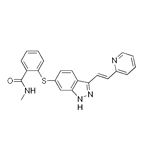Axitinib Fails to Improve Survival in Metastatic Colorectal Cancer
Adding the VEGF inhibitor axitinib to first-line treatment of FOLFOX-6 for metastatic colorectal cancer failed to improve progression-free and overall survival.
Adding the VEGF inhibitor axitinib-alone or in combination with bevacizumab-to first-line treatment with FOLFOX-6 for metastatic colorectal cancer failed to improve objective response rate (ORR), progression-free survival (PFS) and overall survival (OS), according to the results of a randomized phase II study.

Chemical structure of axitinib
The study, led by Jeffrey R. Infante, MD, of Sarah Cannon Research Institute, was conducted based on prior research that had shown that the VEGF inhibitor bevacizumab numerically improved survival in patients with metastatic colorectal cancer when added to first-line FOLFIRI or FOLFOX.
The researchers posited that inhibiting the VEGF-A ligand with bevacizumab and VEGF receptors 1, 2, and 3 with axitinib, “may result in additive antitumor activity” when added to chemotherapy.
“It seemed advantageous that simultaneous inhibition of both the VEGF ligand and its receptor could provide more profound pathway inhibition, which hopefully would lead to improved clinical outcomes,” the authors wrote.
To research that theory, they enrolled and randomly assigned 126 patients with previously untreated metastatic colorectal cancer to treatment with axitinib 5 mg twice daily (n = 42), bevacizumab 5 mg/kg every 2 weeks (n = 43), or axitinib 5 mg twice daily plus bevacizumab 2 mg/kg every 2 weeks (n = 41) in addition to FOLFOX-6. The results of the study were published online in Cancer.
Results indicated that axitinib was numerically inferior to bevacizumab as a first-line treatment. An objective response occurred in 28.6% of patients assigned axitinib compared with 48.8% of patients assigned bevacizumab. Progression-free survival (11 months vs 15.9 months) and overall survival (18.1 months vs 21.6 months) were also inferior in the axitinib arm.
“Unfortunately, simultaneous inhibition of the VEGFR and the VEGF ligand with the combination of axitinib and bevacizumab plus FOLFOX also did not improve ORR, PFS, or OS as compared with bevacizumab plus FOLFOX,” the researchers wrote.
Patients assigned the combination had a 39% ORR, a PFS of 12.5 months, and OS of 19.7 months.
The researchers suggest several possible explanations for the inferior result, including “the reduced dosage of bevacizumab in the axitinib plus bevacizumab arm (2 mg/kg vs 5 mg/kg bevacizumab alone).”
According to the researchers, this lower dose was used after results from the phase Ib study found that a combination dose with bevacizumab 5 mg/kg “was deemed intolerable because of the dose-limiting toxicity of hypertension.”
Common adverse events occurring in more than 49% of patients in all three arms included nausea, fatigue, and diarrhea.